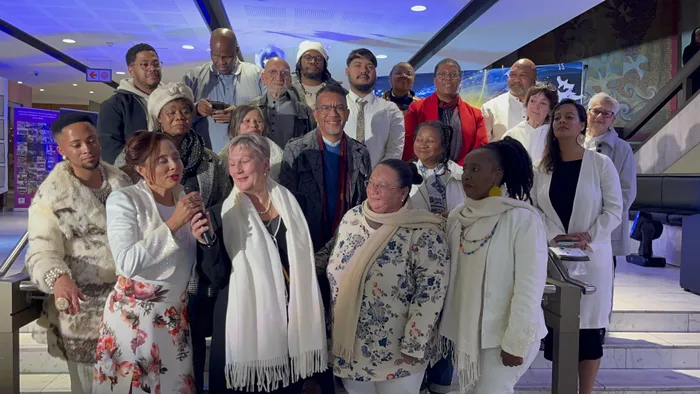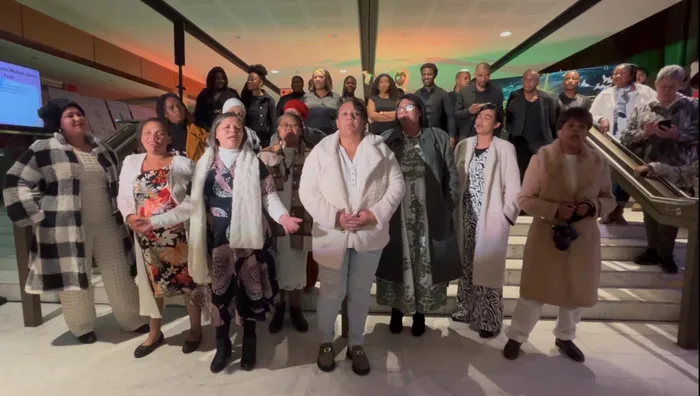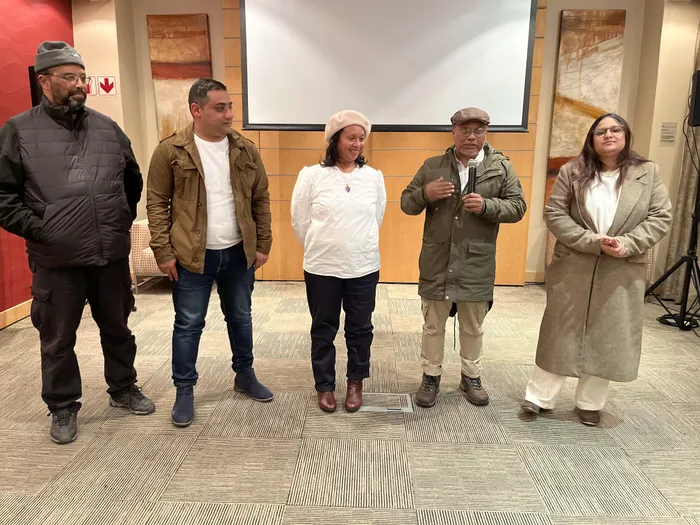Women will prevail at the Artscape's Women's Humanity Festival

Contributors to the 2025 Artscape Women's Humanity Festival, which was launched at the Artscape Theatre Centre, in Cape Town, on Thursday, July 10 and concludes on August 31. In front, from left, are theatre chief executive officer Marlene Le Roux, Police Oversight and Community Safety MEC Anroux Marais, Bush Radio managing director Brenda Leonard and performer and producer Manongi Thusi.
Image: Fouzia Van Der Fort
West Coast women are fishing, creators of crafts, gardeners and entrepreneurs.
They shared their challenges, skills and hope in a 40-minute documentary entitled "Die See, Ons Hartklop" during the launch of the 2025 Artscape Women’s Humanity Festival on Thursday, July 10.
The festival themed “Peace in action - Working together” includes a programme packed with the stories of women, men and activists who have had to work through and overcome their trauma and challenges, which would be showcased from now until the end of Women’s month, August.
There will be an interactive exhibition space with community stalls, health screenings and activations, including the Cancer Alliance and Knit and Natter.

West Coast women sing "bring back the women to lead". They are taking a stand against drilling and mining.
Image: Fouzia Van Der Fort
Activist Vainola Makan introduced the women and the premiere of video and photographic exhibition, which puts a spotlight on the Ubuntu Rural Women and Youth Movement and communities affected by extractive industries on the West Coast.
Ms Makan explained that they spoke to the women from the West Coast and the Northern Cape and they built a family, a women's movement.
"They are saying no to mining because the beautiful ecosystem, in the rural areas that we all go far to see - the quality of life, to experience some of that away from the city would have been no more; if they allow these mining companies to come and extract to do another apartheid, another colonialism, environmental racism, environmental colonialism. They said no," she said.
It details the challenges fisherwomen have had to overcome to better understand and slow down climate change as well as mining and drilling companies affecting their daily bread.
"Young, old, independent and family women are being empowered and are standing up against the government, mining and drilling companies, who are affecting the ocean and life on the coast," said Ms Makan.
Ms Makan and her colleague Wendy Pekeur encouraged all South Africans to have their voices heard when the Department of Forestry, Fisheries, and the Environment (DFFE) ask for input on whether to grant mining and drilling rights.

Film crew "Die See, Ons Hartklop" produced by Live Studios. Cinematographer Adnaan Stemmet, from Plumstead, photographer Zunaid Baba, from Fairways, interviewer and writer Fatima Pandy, from Plumstead, director Malick Abarder, from Lansdowne, and assistant director, screenplay writer and production co-ordinator Saarah Warley, from Rondebosch East.
Image: Fouzia Van Der Fort
Artscape chief executive officer Marlene le Roux said all Capetonians, and those beyond its borders, irrespective of ability, race, culture, identity and religion, were welcomed to the centre during the festival.
She called up representatives from various groups to share what they would be doing at the festival, whether it was writing, film, performances, activism and health screenings.
The festival aims to overcome the injustices of violence, apartheid, inequality and access.
Ms Le Roux called on women and men to unite in the spirit of humanity, collaboration, and courageous compassion.
“In a world scarred by conflict and separation we are choosing to listen, to care, and to work together,” she said.
She addressed issues of gender based violence, exclusivity and discomfort in being able to rid society of stigma.
“Change needs to happen in our homes. How do we rear our young boys, also our young girls? How do we accept our child when they come to you, saying I am who I am?” she said.
Ms Le Roux said the festival was about interfaith, culture and language.
During the launch she called on guests to be ambassadors of the Artscape.
“Say to women they can come to Artscape. It is a building with a difference. It is first and foremost for the arts. We are a building which is open 24-hours.
“Whoever you are, whether you are disabled or not disabled. What the colour of your skin is doesn’t matter to us, or what language you speak,” she said.
Ms Le Roux reminded guests that during the apartheid, before the Artscape, originally known as the Nico Malan Theatre Centre, was initially reserved for white audiences.
It opened in 1971 under the management of the Cape Performing Arts Board (CAPAB) and was programmed exclusively for white audiences, focusing on opera, ballet, drama, and orchestral performances.
"Let us not forget that because of the colour of my skin I was not allowed in this building," she said.
She said that the public should attend the festival's programme and unite to prevent history from repeating itself.
Ms Le Roux said festival partner, Woman Zone, was the only one of its kind in a theatre complex in the world.
“Nowhere in the world in a performing arts complex is there a space where women can come to and men can also pour their hearts out and say 'I want to write my story',” she said.
Nancy Richards, founder and director of the Zone, and coordinator of the Women's Library at Artscape, said she was fully committed to fostering peace through action - not only to honour women.
She spoke about Wire Woman, a 2m high statue of a woman created in 2016, as part of Artscape’s 60th anniversary of the Women’s march in 1956, who will be moved around the corridors of the centre on Saturday August 9.
Designed by Sue Kramer and Lovell Friedman and built by Streetwires, the artpiece was intended to address the shortage of women statues in Cape Town.
The movable statue, will hold the hundreds of paper doves with peace messages written on, from guests to the festival, and will be pulled along the walk through the corridors of the Artscape on August 9.
“She is all woman. She is every woman, with coloured undies and signatures and messages representing us women,” she said.
The women will also be handing over a petition of signatures against domestic violence to Premier Alan Winde.
Anroux Marais, Police Oversight and Community Safety MEC endorsed the programme with love. She said 90 percent of the neighbourhood watch members that she works with are women.
“For me tonight it is so wonderful to so many of you here, especially our women. We also really respect and love our men as well,” she said.
The festival honours icons of peace, individuals whose life work has embodied courage, dialogue and healing.
Judge Albie Sachs, South African lawyer, activist, writer and former judge appointed to SA's first Constitutional Court by late former president Nelson Mandela.
Virginia Davids, associated professor or singing at the University of Cape Town, who made her debut at CAPAB with the title role in Verdi's Aida, an opera set in ancient Egypt, revolving around a love triangle amidst war and cultural conflict.
Thembi Mshali-Jones, one of SA's most acclaimed actors, recognised for her roles in popular television series and stage performances.
Sue Williamson, a SA creative with five-decades of experience in producing art that explores themes of memory and societal justice.
Fahruq Valley-Omar, hailing from Worcester during the apartheid, he is a seasoned stage performer, accomplished director and international film star.
The late professor Nomvula Mthethwa, remembered as a symbol of resilience against apartheid, who set up community centres in areas where black people had been forcibly displaced.
These icons will be celebrated through keynote events, performances and conversations, anchoring the festival's values in the lived wisdom of changemakers.